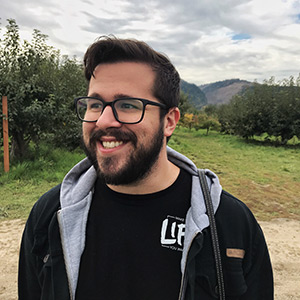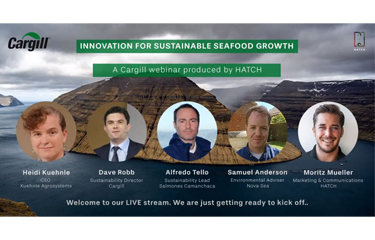In a recent webinar hosted by the aquaculture technology investment firm Hatch, an international panel of aquaculture leaders connected virtually to discuss the importance of sustainability in the industry and the space innovation on that front, now and in the future.
“The world now produces more than 155 million tons of seafood every year. Around 55 percent of that comes from aquaculture. As our population is growing, demand continues to rise, and within the next 50 years we will have to grow more seafood than we have ever grown in the entire existence of mankind,” said Moritz Mueller, the head of marketing and communications at HATCH. “At the same time, understanding the limits of our oceans and protecting them, in order to keep our planet healthy is an essential task. This seafood, and the feed for it, will not come from our wild stocks, but it has to come from aquaculture. And only an industry that is sustainable will be able to shoulder such a responsibility.”
The session centered around the most recent sustainability report from Cargill, one of the largest feed companies globally. The company produces feed for salmon, shrimp, tilapia, and other marine species in 20 countries, supported by innovation centers in Chile, Norway and the U.S.
The sustainability report breaks down what Cargill has targeted as key challenges facing the global aquaculture industry, including sustainable supply chains, animal health and welfare concerns, accountability through proper measuring and reporting industry-wide, and addressing widespread misinformation related to aquaculture. The 45-page report details how Cargill believes the industry should rise to meet these challenges with a three-pronged focus on “healthy people, healthy animals, and a healthy planet.”
Participants in the webinar were asked what they believed are new technologies and ingredients that will help advance sustainability in the industry, as well as challenges in bringing those solutions to market.
Heidi Kuehnle, CEO and founder at Kuehnle Agro, a Hawaii-based biotechnology company, spoke about the widening gap between the increasing demand for protein and fish oil for fish farms and the ocean’s dwindling natural supply due to overfishing.
“These innovations are coming up with new sources of proteins, new sources of oils,” she said. “Those innovations can range the gamut from microbial fermentations, some what we do with algae, but also, there's other organisms like bacterial sources of protein … you can also source the protein from insects.”
One issue Kuehnle said the industry will face when moving toward using more sustainable fish feed ingredients and processes is making sure efforts resonate with customers and stakeholders.
“How do we measure it? How do we qualify it?” she asked, before explaining the company’s success participating in sustainability certification programs.
Underpinning sustainability goals is, of course, traceability and transparency in the global seafood supply chain. Alfredo Tello, sustainability lead at Chilean salmon farmer Salmones Camanchaca, spoke on how the Internet of Things has led to greater connectivity across the supply chain – meaning there’s more data to share and it costs significantly less than it did just years ago. But there’s still work to be done on that front for companies to take full advantage of data systems to increase traceability.
“I think what’s probably lacking – at least in our sector, I haven’t seen it – is companies fully embracing a more robust traceability system that is able to register new and novel attributes to their products,” said Tello, noting that the more factors that are traced, the greater the opportunity for companies to reduce costs and waste.
He also stressed the importance of transparency in sustainability initiatives. The more companies are transparent and, in turn, pressure others in the industry to do better, the faster the industry-wide movement toward sustainability will be. Organizations like the Global Sustainable Seafood Initiative, of which Salmones Camanchaca is a founding member, have made aligning global efforts and resources to address seafood sustainability challenges its mission.
Sustainability organizations reporting allows companies to learn more about where the entire industry is headed, as well as compare themselves to the average.
“You can go look at the numbers from the other guy – you can see your neighbors,” said Samuel Anderson, environmental adviser with Norwegian salmon famer Nova Sea. “How are they doing? Oh, we can do a little bit better next year. They’re doing similar things with your numbers. Everybody's sort of pushing each other in a more sustainable direction. I think that's really positive.”
Anderson also said a lack of disclosure of antibiotic use has had a negative effect on the public’s opinion of seafood. Since the late eighties, there has been a 99 percent reduction in the usage of antibiotics in Norwegian ocean-farmed salmon due to effective vaccines in the early stage of the salmon’s life cycle, but that reality has yet to seep into public knowledge, he said.
Anderson noted a 2018 survey from the Norwegian Seafood Council in which a high percentage of respondents who did not eat Norwegian salmon said they were concerned about antibiotic use.
Regarding the COVID-19 pandemic, there were concerns raised that companies might pause any sustainability initiatives due to lost profits or consumers facing financial hardships and choosing shepherd products. But each participating speaker urged listeners to keep the momentum moving forward, despite how difficult it may be under the pandemic.
Photo courtesy of HATCH







